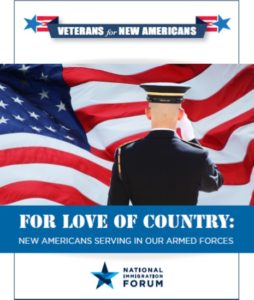 After Colin Powell died, I was reminded that there have long been people who have been immigrants and/or non-citizens who have joined the US military. I found a link titled Veterans for New Americans with a Non-Citizens in the U.S. Military Fact Sheet.
After Colin Powell died, I was reminded that there have long been people who have been immigrants and/or non-citizens who have joined the US military. I found a link titled Veterans for New Americans with a Non-Citizens in the U.S. Military Fact Sheet.
“To join the U.S. military, non-citizens must be living permanently and legally in the United States. Non-citizens must also have permission to work in the United States, possess an I-551 (Permanent Residence Card), have obtained a high school diploma, and speak English…
“Between 1999 and 2010, approximately 80,000 non-citizens joined the U.S. military force. Most recent data from the Department of Defense (DOD) showed that 24,000 noncitizens were on active duty in 2012, with 5,000 legal permanent residents (LPRs) enlisting into the U.S. military force each year…
“From FY2001-FY2015, USCIS naturalized 109,321 noncitizen service members. Since 2008, USCIS has also naturalized 2,650 military spouses.”
A 2019 article looked at the 2017 American Community Survey. 697,711 foreign-born veterans lived in the United States, comprising 3.5 percent of all veterans; 190,198 foreign-born individuals were actively serving in the military comprising 4.5 percent of all active-duty service members.
The US Foreign Legion, as it were
An August 2021 Washington Post article reads: “The U.S. government hasn’t protected noncitizen veterans from deportation. That may change.” And “The U.S. military has a long history of relying on foreign recruits.”
But from DHS and the VA comes the announcement of an “Initiative to Support Noncitizen Service Members, Veterans, and Immediate Family Members.”
WaPo: “Noncitizens have played critical roles in every war that the United States has fought. Decades after the Marquis de Lafayette served as an aide to General George Washington during the American Revolution, tens of thousands of Canadians and Europeans joined the Union Army during the U.S. Civil War. And hundreds of thousands of Black soldiers fought in the Civil War, their service all the more remarkable given that the U.S. government denied them citizenship.”
Over time, I’ve noted that a number of black Americans have used serving in the military as a way to “prove” their “worthiness” as Real Americans. This has been true from the Revolutionary War through at least through World War II. Perhaps Powell, as a black from Jamaica, consciously or not, may have used his service in Vietnam in the same matter.
“As modern militaries increasingly field sophisticated weapons systems, countries have also looked to noncitizens to bring much-needed technical skills into the ranks, as well as expertise in foreign languages and cultures in areas where the military operates.
This reminds me of, for instance, the Afghan translators who often risked their very lives working with the US military. I wish them every opportunity to come to this country and have the good chance to become citizens.

 The first substantial story about the death of Colin Powell that I saw appeared in
The first substantial story about the death of Colin Powell that I saw appeared in 

